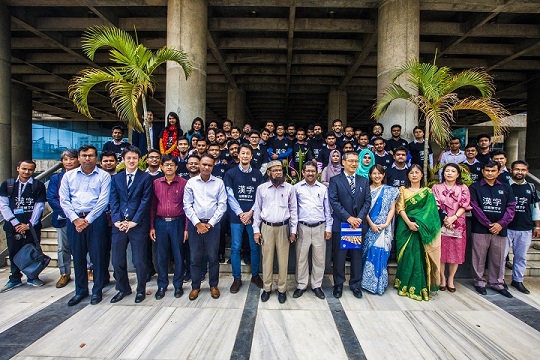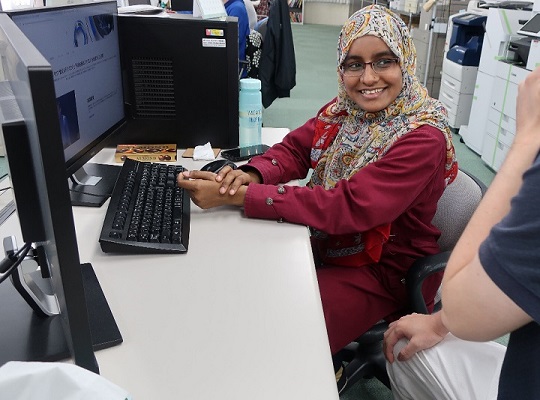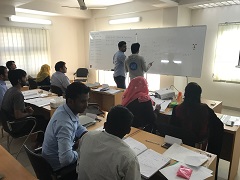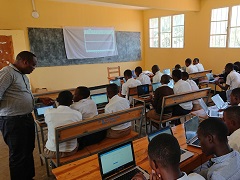- Home
- News & Features
- News
- FY2019
- ICT-era international cooperation as seen in Bangladesh: Comprehensive support “now” through human resource development and job creation
News
September 27, 2019
ICT-era international cooperation as seen in Bangladesh: Comprehensive support “now” through human resource development and job creation
The creation of jobs and the promotion of economic activity brought about by ICT (Information and Communications Technology) is a beacon of hope for international cooperation in developing countries. The current trend of support for infrastructure development related to such things as telecommunications facilities and broadcast-related equipment, that has been the center of conventional ICT support, is comprehensive support that includes human resource development. It is expected that poverty reduction and economic growth will be achieved by utilizing ICT technology with a view to achieving the “SDGs (Sustainable Development Goals).”
JICA implements international cooperation among various countries in order to rectify the global Internet disparity and bring about fair and equitable benefits and new employment through ICT. We will introduce the current status of ICT support, using the example of "ICT human resource development targeting the Japanese market (Bangladesh-Japan ICT Engineers' Training Program; the B-JET program)” in Bangladesh, which shows vigorous and wide-spread development.
 Participants of the B-JET program in Bangladesh. A narrow gate with a magnification of about 130 times.
Participants of the B-JET program in Bangladesh. A narrow gate with a magnification of about 130 times.
Providing opportunities for Bangladeshi ICT professionals
“I never even imagined that I could build a career in the ICT industry in Japan. It felt like a dream had come true for me. I'm currently learning new technologies and honing my skills every day.” says Ms. Marzia who works as a web engineer at an ICT company in Miyazaki City since 2018, and is a graduate of the B-JET program started by JICA in Bangladesh in 2017.
 B-JET graduate Ms. Marzia. Taking advantage of the knowledge she attained at the B-JET program for the Japanese ICT market, she is working for a Web API (note 1) at an ICT company in Miyazaki City.
B-JET graduate Ms. Marzia. Taking advantage of the knowledge she attained at the B-JET program for the Japanese ICT market, she is working for a Web API (note 1) at an ICT company in Miyazaki City.
note 1: Technology for utilizing functions provided by external hardware and software via the internet in order to efficiently develop websites.
The B-JET program is a groundbreaking project that has been developed to compensate for the shortage of employment opportunities for ICT talent in Bangladesh and the shortage of talent in Japan. Japan has not been able to meet the growing demand for ICT engineers due to the declining labor force accompanying its declining birthrate. In addition, combined with the unique regional characteristics of Japan, such as language and employment practices, it can be said that the influx of overseas human resources into the ICT industry in Japan is not as many as in the West, such as Silicon Valley or Europe where excellent engineers gather from all over the world.
 In the B-JET program, 20 to 40 students per term receive 3 months of training in the JICA technical cooperation project. Lecturers teach ICT skills, Japanese language, and Japanese business manners, and many of the graduates gain employment as full-time employees by Japanese ICT companies based in Bangladesh and Japan.
In the B-JET program, 20 to 40 students per term receive 3 months of training in the JICA technical cooperation project. Lecturers teach ICT skills, Japanese language, and Japanese business manners, and many of the graduates gain employment as full-time employees by Japanese ICT companies based in Bangladesh and Japan.
In contrast to Japan, Bangladesh lacks employment opportunities for abundant ICT talent. Over the past 10 years, GDP has grown by more than 6%, and the country's economic growth has been supported by the exports of the garment manufacturing industry, which accounts for 80% of exports, and remittances from overseas workers. Industrial diversification is an important issue, and the fast-growing ICT/software industry is positioned as one of the top industries.
"I want to return to Bangladesh in the future and make the most of my experience in Japan," says Ms. Marzia. ICT skills are common throughout the world, and if you master them, you can work in any country, and it is a chance of employment beyond borders.
Project to compensate for the needs of the two countries
One of the most noteworthy aspects of the B-JET program is the well-established acceptance system for graduates through collaboration with Miyazaki University, Miyazaki City, and local IT companies in the area. Although the acceptance of graduates in Japan is outside the scope of JICA's cooperation, the city of Miyazaki which promotes the accumulation of IT industry, Miyazaki University which promotes establishment of a Japanese language education, and local IT companies who want to actively recruit advanced ICT personnel from Bangladesh cooperate, and a system is in place to allow young people in Bangladesh to settle in Japan with peace of mind. In addition, other local governments and private companies are also considering improving their systems referencing to the Miyazaki City model.
Structural diagram of the Bangladesh-Miyazaki model
 Miyazaki City, in particular, cooperates with B-JET to build an intern program after completing the B-JET program in cooperation with industries, academia, and government. It has been successful in accepting and establishing B-JET alumni.
Miyazaki City, in particular, cooperates with B-JET to build an intern program after completing the B-JET program in cooperation with industries, academia, and government. It has been successful in accepting and establishing B-JET alumni.
JICA fosters human resources in a variety of approaches, according to the situation of the countries to be supported. While communication and broadcasting technologies such as 4K and 5G continue to evolve rapidly, it is important for developing countries to have the knowledge and experience to select and apply the “latest technology” as well as the “best technology” to improve the lives of people in their countries.
ICT will fuel the achievement of “SDGs”
The “SDGs,” adopted by the United Nations in 2015, are indispensable for discussing international cooperation, including ICT support. The objective is to "create a sustainable, diverse and inclusive society with no one left behind," to solve the world's challenges, including poverty, hunger, education, and inequality, by 2030. However, as it stands, it is difficult to achieve the target, and ICT is attracting attention as a catalyst for economic activity.
 A "Smart Classroom" in a Rwanda public junior high school. In the country, PC education is being provided from elementary school to all students, and the distributed PCs are equipped with arithmetic learning software developed by a Japanese company (Sakura Co., Ltd.) supported by JICA's private partnership project.
A "Smart Classroom" in a Rwanda public junior high school. In the country, PC education is being provided from elementary school to all students, and the distributed PCs are equipped with arithmetic learning software developed by a Japanese company (Sakura Co., Ltd.) supported by JICA's private partnership project.
(Photo: Tomoyuki Naito, March 2019)
In particular, in Africa, start-up companies in the ICT industry are emerging one after another. Innovations born through ICT technology using such things as drones and smartphone apps are occurring everywhere in the region, and it is creating an untraditional development curve coined the "leapfrog phenomenon," which means the development is in leaps and bounds. Tomoyuki Naito, Senior Advisor for ICT and Innovation for Development at JICA, said with expectancy, "If we don't jump somewhere, we won't be able to achieve the ‘SDGs.’ In various fields, the support to create new values by utilizing ICT in a leapfrog manner should be the jumping ramp. In a few years, the same thing will be accomplished with the B-JET program in Africa. Some countries have already begun to plan similar business models. The spread of the internet has increased the growth potential of developing countries."
The internet was invented approximately half a century ago. ICT technology has become the leading core technology of the times, and it has penetrated throughout all our lives to the point that it is now called “the ICT age.” International cooperation continues to seek forms that are in line with the times and the respective countries.
Related Links
- About JICA
- News & Features
- Countries & Regions
- Our Work
- Thematic Issues
- Types of Assistance
- Partnerships with Other Development Partners
- Climate Change / Environmental and Social Considerations
- Evaluations
- Compliance and Anti-corruption
- Science and Technology Cooperation on Global Issues
- Research
- JICA Development Studies Program / JICA Chair
- Support for the Acceptance of Foreign HRs / Multicultural and Inclusive Community
- Publications
- Investor Relations





